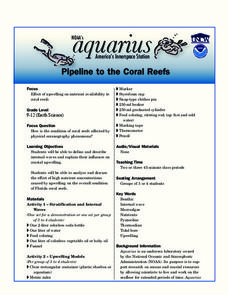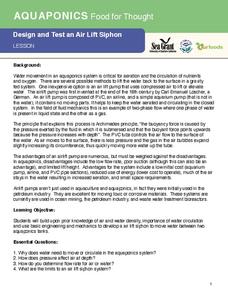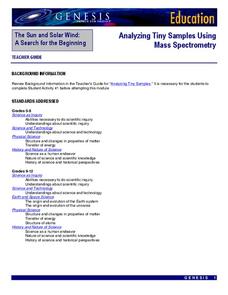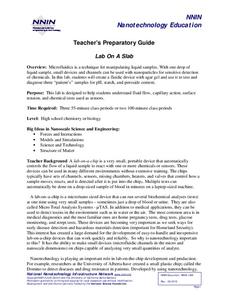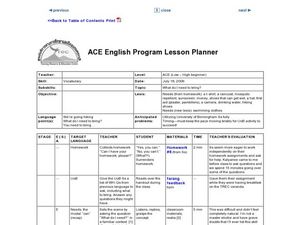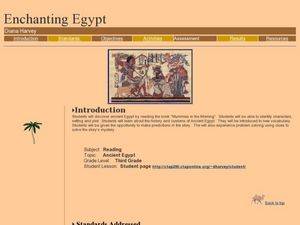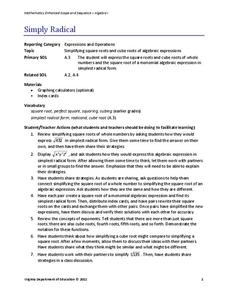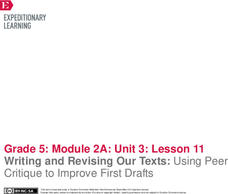Florida International University
Pipeline to the Coral Reefs
Discover firsthand the effects of internal waves on coral reefs. Through a series of experiments, learners simulate internal waves and upwelling events as they make observations on the movement of water and other debris. They then...
University of Southern California
Design and Test an Air Lift Siphon
Build an air lift siphon using your mad physics skills! Learners first investigate the importance of circulating water in aquaponics systems. They then use density to their advantage as they engineer an air lift siphon
Beyond Benign
Breaking the Tension
The tension builds as learners experiment in your classroom. The 17th installment in a 24-part series has scholars investigate the concept of surface tension. After discovering characteristics of surface tension, they add a compound...
NASA
Analyzing Tiny Samples Using a Search for the Beginning Mass Spectrometry
Teach the basics of mass spectrometry with a hands-on lesson. The fourth in a series of six lessons explores how mass spectrometry measures the ionic composition of an element. Learners then compare and contrast relative abundance and...
NASA
Exploring Data
Bring the sun to your class! Young scholars analyze actual solar wind data in the second lesson of a five-part series. Their analysis includes speed, temperature, and density data.
Virginia Department of Education
Organizing Topic: Probability
The probability is high learning will occur! A well-designed unit introduces learners to the concepts of independent, dependent, and mutually exclusive events. Using Venn diagrams, the lessons ask learners to analyze many different...
EngageNY
Checking for Identical Triangles II
Given a diagram of connected or overlapping triangles, individuals must find congruent parts using various properties. Pictures include reflexive sides and vertical angles amongst the marked congruent parts.
EngageNY
Conditions for a Unique Triangle—Two Angles and a Given Side
Using patty paper, classes determine that only one triangle is possible when given two specific angle measures and a side length. As the 10th instructional activity in the series of 29, young math scholars add these criteria to those...
Statistics Education Web
Using Dice to Introduce Sampling Distributions
Investigate the meaning of a sample proportion using this hands-on activity. Scholars collect data and realize that the larger the sample size the more closely the data resembles a normal distribution. They compare the sample proportion...
World Wildlife Fund
Arctic Food Chain
Explore the food chains that support Arctic ecosystems. A class discussion on interdependence and the different roles plants and animals play in ecosystems provides young scholars with the knowledge to complete a worksheet asking them to...
LABScI
Acids and Bases: Cabbage Juice pH Indicator
Explore the range of pH using an assortment of household liquids. Scholars create their own pH indicators from cabbage and determine the pH of several liquids. To further their exploration, individuals use the same liquids to create...
National Nanotechnology Infrastructure Network
Lab On A Slab
Capillary action is the frugal chemist's dream ... the less liquid used, the more tests they can run! Learners experiment with the best design to maximize the benefits of capillary action. Using a liquid sample, they design a capillary...
Curated OER
Notetaking Procedures
Sixth graders explore notetaking procedures. In this study skills lesson, 6th graders use text organizers to categorize information. Students select textbook sections and write headings, subheadings, and summary phrases for each...
Curated OER
Food Poems and Base Words
Students identify base words to decipher new vocabulary. In this vocabulary lesson, students complete a graphic organizer while reading about food and nutrition. Students discuss simple and complex endings when using words.
Curated OER
What Do I Need to Bring?
Students build their vocabulary skills by answering the question; "What do need to bring?" For this ESL lesson, students create several different graphic organizers to help them categorize vocabulary concepts. Then they read a...
Curated OER
Genetics and Heredity
Students explore genetics and heredity. They study meiosis and view videos and create vocabulary flashcards. They create a graphic organizer that compares and contrasts sexual and asexual reproduction in each of the six kingdoms. They...
Curated OER
Writing A Storybook
Students create a storybook using vocabulary from the topic "urban and rural life". They write about past events in a children's story. They present their story to the class at an author's tea.
Curated OER
Enchanting Egypt
After reading the Magic Tree House book Mummies in the Morning, learners talk about Ancient Egypt. They identify the plot, characters, setting, etc., explore vocabulary terms, and construct a pyramid. This will motivate your class...
Virginia Department of Education
Rational Speed Matching
Ready, set, go! Individuals practice converting rational numbers between fractions, decimals, and percents. A speed game has teams match the three forms of rational numbers on a number line.
Curated OER
Capitals, Designers & Common Fashion Terms
The importance of fashion on society is identified and new vocabulary associated with fashion is defined. Using the internet, your class will identify the major fashion capitals of the world and write about one. To end the lesson plan,...
Virginia Department of Education
Simply Radical
Simplifying is radical, dude! After reviewing how to simplify square roots of whole numbers, scholars consider how to simplify square roots of algebraic monomials. Also taken under consideration is how to simplify cube roots of whole...
Curated OER
Scientific Method
Students explore the scientific method. In this scientific method instructional activity, students use information gathered from a "Seed Dispersal" lab done previously to complete a worksheet listing the steps of the scientific method.
EngageNY
Writing and Revising Our Texts: Using Peer Critique to Improve First Drafts
Mail me a postcard. Individuals design a postcard to show what Meg Lowman from The Most Beautiful Roof in the
World might have written to her friends at home. They then continue to work on writing a science journal entry.
Curated OER
Using Amino Acid Sequences to Show Evolutionary Relationships
Junior biologists compare the amino acid sequences from fragments of five different globin molecules. They count the letter differences between each species pair. They construct a graphic representation of the evolutionary relationships...
